Theorem Blu-ray Movie
HomeTheorem Blu-ray Movie 
Teorema / Blu-ray + DVDBFI Video | 1968 | 98 min | Rated BBFC: 15 | May 27, 2013
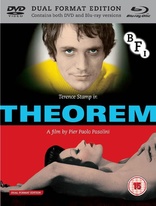
Price
List price:Amazon: £16.99 (Save 3%)
Third party: £16.99 (Save 3%)
Only 6 left in stock (more on the way).
Movie rating
7 | / 10 |
Blu-ray rating
| Users | 0.0 | |
| Reviewer | 4.5 | |
| Overall | 4.5 |
Overview
Theorem (1968)
A mysterious stranger seduces the members of a wealthy Milanese family, precipitating an existential crisis in each of their lives.
Starring: Silvana Mangano, Terence Stamp, Massimo Girotti, Anne Wiazemsky, Laura BettiDirector: Pier Paolo Pasolini
| Foreign | Uncertain |
| Drama | Uncertain |
| Surreal | Uncertain |
| Mystery | Uncertain |
Specifications
Video
Video codec: MPEG-4 AVC
Video resolution: 1080p
Aspect ratio: 1.84:1
Original aspect ratio: 1.85:1
Audio
Italian: LPCM 2.0
English: LPCM 2.0
Subtitles
English
Discs
50GB Blu-ray Disc
Two-disc set (1 BD, 1 DVD)
DVD copy
Playback
Region B (locked)
Review
Rating summary
| Movie | 5.0 | |
| Video | 4.0 | |
| Audio | 4.0 | |
| Extras | 3.5 | |
| Overall | 4.5 |
Theorem Blu-ray Movie Review
Reviewed by Dr. Svet Atanasov July 28, 2013Winner of Best Actress Award at the Venice Film Festival, Pier Paolo Pasolini's "Theorem" a.k.a "Teorema" (1968) arrives on Blu-ray courtesy of the British Film Institute. The supplemental features on the release include new trailer for the theatrical re-release of the film; video interview with actor Terence Stamp; and an audio commentary by Italian film expert Robert Gordon. The release also arrives with a 14-page illustrated booklet featuring Geoffrey Nowell-Smith's essay "Theorem"; review of the film by Philip Strick; and biographies of Piere Paolo Pasolini and Terence Stamp. In Italian or English, with optional English subtitles for the main feature. Region-B "locked".
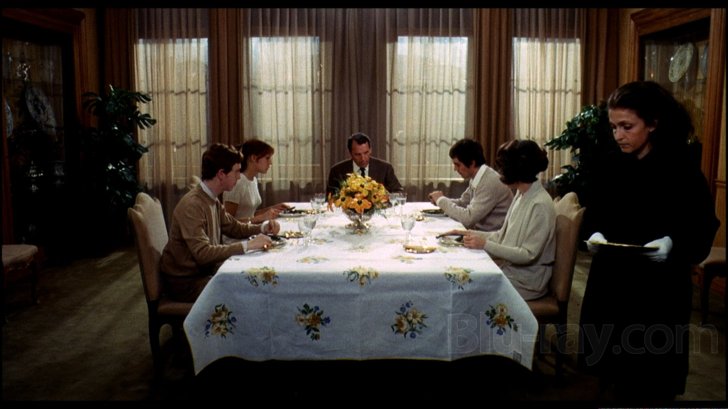
The family
The film opens up with a short prologue in which an agitated reporter interviews a group of workers in front of a giant factory. Some of the men look surprised, some look confused. They are the new owners of the factory but are unsure what their responsibilities are. When they followed orders it was easier for them to react, to be united, to know their enemy. But now it seems like their enemy has evolved and is making the revolutionary changes they should have demanded.
The action moves to a luxurious villa in the wealthiest area of Milan. This is where the former owner (Massimo Girotti, Ossessione, La finestra di fronte) of the factory and his family live. Shortly after all members of the family gather in the villa for a rather boring party, a handsome stranger appears (Terence Stamp, The Hit, Spirits of the Dead). At first no one seems to notice him, but he quietly observes them. Later on the mother, Lucia, (Silvana Mangano, Conversation Piece, Riso Amaro), her daughter, Odetta (Anne Wiazemsky, La Chinoise, Rendez-vous), and the maid, Emilia (Laura Betti, A Bay of Blood, Novecento) begin observing the stranger while he casually wanders around the villa. After the party, Pietro (Andrés José Cruz Soublette), the son, is asked to share the same room with to the stranger and he talks to him while getting ready to go to bed. Soon after, the father also notices the stranger.
The rest of the film is about a series of dramatic character transformations, each initiated by the stranger. But why? And who is the stranger?
The first question is easy to answer. The stranger inspires the family members to drop the bourgeois masks they have been wearing – the bored Lucia decides to stop being a mother and goes on the road looking for men that will make her feel alive again; Odetta reveals that she is finally ready to fall in love but instead has a life-altering divine experience; Pietro turns his back on Renaissance art and embraces abstract art; Emilia finds the courage to leave her employers and becomes a saint; and the father stops carrying about his image and goes on a spiritual journey after visiting Milano Centrale.
The second question isn’t easy to answer. For years film critics have been speculating that the stranger could be God. But is he? And does it really matter? In Theorem he is essentially Pasolini’s litmus test, a force that can corrupt or free people regardless of their social status, regardless of their past history. And once he does, Pasolini goes on to show how and why all of their beliefs, ideas and values should be questioned. Whether the force is God, or the Devil, or something else is irrelevant. The message of the film is that politics, art, and religion are used to manipulate and control those who are naive enough not to question their function.
Because there is very little dialog in the film, the communication is done primarily through series of carefully composed images. Some are quite unusual. For example, the cold and bleak panoramic shots from the factory very much remind of Michelangelo Antonioni’s Red Desert, while some of the footage from the finale could have easily been used in Alejandro Jodorowsky's El Topo. The film was lensed by the great cinematographer Giuseppe Ruzzolini, who also collaborated with Pasolini on Oedipus Rex and Arabian Nights.
Some of the most atmospheric sequences in Theorem are enhanced with music by W. A. Mozart (Requiem, Lacrimosa) and the legendary Ennio Morricone.
Note: Theorem is the second film in Pasolini’s “Mythical Cycle”. The remaining films are Oedipus Rex, Porcile and Medea.
Theorem Blu-ray Movie, Video Quality 

Presented in an aspect ratio of 1.84:1, encoded with MPEG-4 AVC and granted a 1080p transfer, Pier Paolo Pasolini's Theorem arrives on Blu-ray courtesy of the British Film Institute.
The following text appears inside the booklet provided with this Blu-ray release:
"Theorem has been mastered in High Definition from an original 35mm interpositive held by Channel 4. HD-DVNR and MTI restoration tools have been used to remove instances of negative sparkle, severe scratching and other damage such as tearing and bad splices. Some audio remastering has been undertaken to improve the quality of the original Italian track and alternative English dub. Every has been made to present Theorem in its best possible condition.
Technical production: Douglas Weir, James White (BFI).
Restoration: Graham Jones, Tom Barret, Mark Bonnici (Deluxe, Soho)."
The technical presentation is very pleasing. Despite the fact that large portion of Theorem were shot in cinema verite style, there are only minor clarity and contrast fluctuations. Even the desaturated footage early into the film looks very good (and far better than it does on the R1 DVD release). The overwhelming majority of the close-ups look appropriately thick and rich (see screencaptures #2 and 4). The larger panoramic shots also boast very good fluidity (see screencapture #5). There are no traces of excessive degraining corrections. Post-production sharpening adjustments have not been applied either. There are no serious stability issues, but a few shaky frame transitions are present. Also, a couple of extremely light vertical lines (see screencapture #9) and tiny flecks (see screencapture #19) remain. Overall, however, the film has a very solid and very convincing organic look that should definitely please those who have previously experienced it only on DVD. (Note: This is a Region-B "locked" release. Therefore, you must have a native Region-B or Region-Free PS3 or SA in order to access its content).
Theorem Blu-ray Movie, Audio Quality 
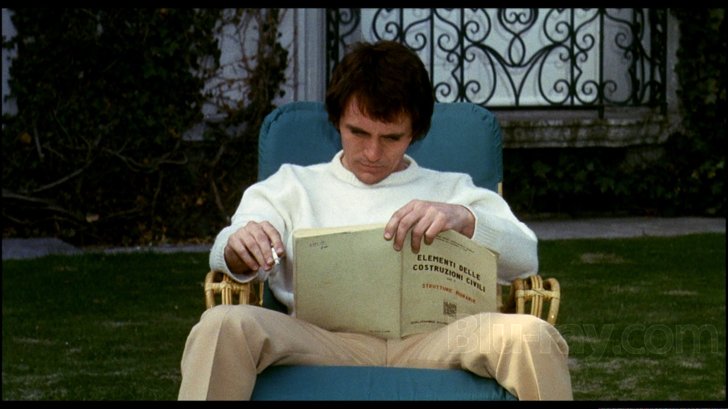
There are two standard audio tracks on this Blu-ray release: Italian LPCM 2.0 and English LPCM 2.0. For the record, the British Film Institute has provided optional English subtitles for the main feature.
Depth and clarity are fairly good on the Italian track. There are some minor fluctuations in terms of dynamic movement, but they are clearly inherited. (Original overdubbing was done on the Italian track which is why there are also some very small lip sync issues). Ennio Morricone's tracks have plenty of depth. The overall dynamic intensity, however, is fairly modest. For the record, there are no pops, cracks, heavy background hiss, audio dropouts, or distortions to report in this review.
Theorem Blu-ray Movie, Special Features and Extras 
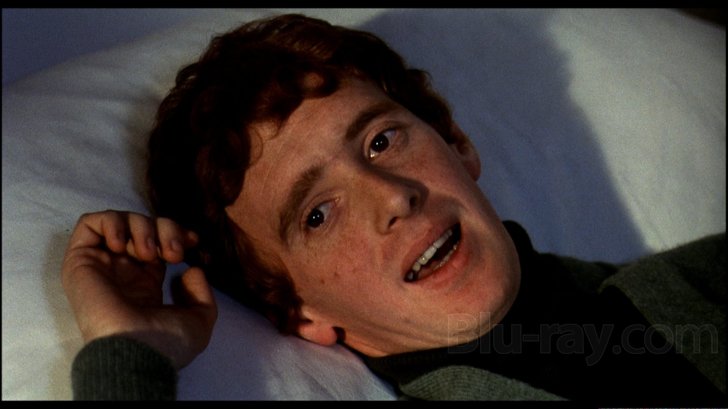
Blu-ray
- Trailer - original trailer for the 2013 theatrical re-release of Theorem. In Italian, with imposed English subtitles. (2 min).
- Commentary - this audio commentary was recorded by Italian film expert Robert Gordon. It initially appeared on the British Film Institute's 2007 R2 DVD release of Theorem.
- Interview - in this archival video interview, actor Terence Stamp recalls how he became involved with Theorem and talks about his early work with Federico Fellini (Stamp played an English actor in Fellini's segment in Spirits of the Dead), his first encounter with Silvana Mangano, the Sixties philosophies and their influence on Pasolini's films, etc. The interview was conducted by Rossana Capitano in London, in 2007. This interview initially appeared on the British Film Institute's R2 DVD release of Theorem. In English, with optional English subtitles. (34 min, PAL).
- Booklet - 14-page illustrated booklet featuring Geoffrey Nowell-Smith's essay "Theorem"; review of the film by Philip Strick; and biographies of Piere Paolo Pasolini and Terence Stamp.
Theorem Blu-ray Movie, Overall Score and Recommendation 
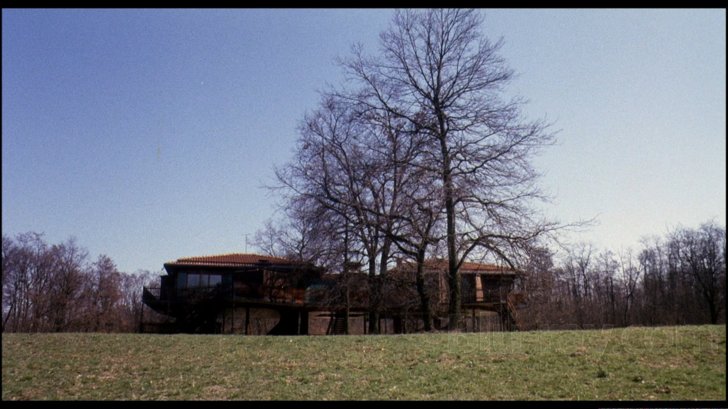
The British Film Institute's Blu-ray release of Piere Paolo Pasolini's masterful Theorem is quite the revelation. The film looks rich and healthy, unquestionably the best it ever has. The supplemental features that were included on the 2007 DVD release are also present on the Blu-ray. If you have even the slightest interest in late '60s/early '70s European Cinema, see Theorem. I guarantee you will experience a very different, very special film. VERY HIGHLY RECOMMENDED.
Similar titles
Similar titles you might also like

Medea
1969

Pigsty
Porcile / Masters of Cinema
1969

Hawks and Sparrows
Uccellacci e uccellini / Masters of Cinema
1966

Oedipus Rex
Edipo Re / Masters of Cinema
1967

Accattone
Masters of Cinema
1961

The Gospel According to Matthew
Il vangelo secondo Matteo / Masters of Cinema
1964

Belle de Jour
50th Anniversary Edition | Vintage World Cinema
1967

Red Desert
Il deserto rosso
1964

Loveless
Нелюбовь / Nelyubov
2017

Goodbye to Language 3D
Adieu au Langage 3D
2014

The Image Book
Le livre d'image
2018

Zama
2017

La Chinoise
Arrow Academy
1967

Horse Money
Cavalo Dinheiro
2014

The Conformist
Il Conformista / Arrow Academy
1970

L' Avventura
1960

Pasolini
2014

Cemetery of Splendour
รักที่ขอนแก่น / Rak ti Khon Kaen
2015

Three Brothers
Tre fratelli / Arrow Academy
1981

Jeune & Jolie
Young & Beautiful
2013